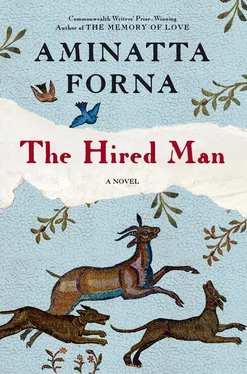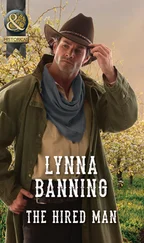Now the camera focused on three men sitting side by side; each of them also wore a set of headphones. One sat with his back hunched and his elbows resting on his knees, staring straight ahead. The second leant back in his chair, his arms folded behind his head. The third appeared to be trying to catch the eye of someone in the room: he was smiling and flicking his eyebrows up and down. Behind them stood two men in blue uniforms. The picture changed again to show rows of men dressed in black gowns seated behind computer monitors. All of them were wearing headphones. The camera returned to the black woman in the judge’s chair who began to read aloud from the piece of paper.
‘Cunt.’ Fabjan pointed the remote at the television, changed the channel then stalked off to the back room.
Let me tell you about Fabjan. Fabjan was not born in Gost. He arrived twenty-two years ago and brought with him a wife and a son. He had an uncle here, who lived alone. Fabjan and his wife moved in with him and when the old man died they had the house. People said he’d made money working in Australia, in the opal mines; the truth is nobody knew. I didn’t live in Gost at that time and when I came back Fabjan was already somebody in town, part-owner of the Zodijak. His partner at the Zodijak was Javor Barac, who I’d known for years. Javor’s father was head of the post office, my father’s boss. Every year I’d see Javor at the post office Christmas party, both of us pressed into wearing our smartest clothes, in both our cases a pair of black trousers and a ruffled shirt. Different kinds of men: I’m talking now about Javor and Fabjan. Javor was as easy-going as Fabjan was flash, but they made a good team. By the time I arrived back in Gost Fabjan was driving the only BMW in town. His teeth were a whole lot better back then.
Javor looked up to Fabjan, because in that time of shortages Fabjan always seemed to be able to get hold of whatever he wanted: coffee, sugar, even a pinball machine. Later, a video, a Betamax unfortunately. All the same, no other bar had one. You needed to know somebody, or know how to work the system to do anything in those days, whether that was to become the owner of a private business, or buy a pinball machine or get hold of black market videos. I used to wonder why Fabjan needed Javor at all, but maybe he saw Javor as the quickest way to be accepted in Gost, because Javor’s father was head of the post office and an important man in the town. The pinball machine made sure the bar was full every night. Full of lads in denim jackets and flared jeans, out of fashion everywhere but Gost. They played Turbo-folk day and night, drank beer and played pinball.
Fabjan’s wife wears a fur-collared coat and heavy jewellery. She draws the shape of her mouth with pencil and smokes skinny menthol cigarettes. You could say she’s good-looking, though she’s grown heavy around the jaw and if she knows about the women Fabjan takes into the back room at the Zodijak, she doesn’t let on. She has two grown sons and a hair-dressing salon. Last year when Fabjan arranged a party for her birthday he took over the whole banqueting suite of the hotel and hired a tribute band from the city.
People often wonder why Fabjan, with all his money, doesn’t leave Gost and try his luck somewhere else: one of the cities on the coast where he could own a bigger bar, maybe a hotel even, and then he could really be somebody. Gost is such a small place for a man of his talents. Nobody has ever asked me, but if they did I would say to them: maybe Fabjan just likes it here too much.
I asked Laura, Grace and Matthew to come and have dinner at my house, a return invitation. Too few chairs: I spent time in the morning fixing one with a broken leg. I took a haunch of venison from the outside freezer, potatoes from the store and helped myself to some more of the chard at the back of the blue house. In my store I had some ajvar I’d made with aubergines and peppers from my own beds the year before. Later I went into town for bread and wine. In the bakery, the woman behind the counter — I told you she’d been married to a cousin of mine — as she wrapped my loaf, asked, ‘Where’s your friend?’
‘Who?’
‘ Engleskinja .’
I shrugged. I said, ‘I don’t know her, I was just helping out.’
She stood with her hands on her hips and regarded me through narrowed eyes, shrugged to show me she didn’t care and shifted her flat gaze to the next customer.
At home I made a caramel pudding and put it in the fridge. After I prepared everything for the rest of the meal I went upstairs to wash and change into my other good shirt. Back downstairs I put on a Johnny Cash cassette and laid the table. I have a lot of crockery. My sister didn’t want to take all this stuff to Zagreb, but my mother wouldn’t give away the serving plates, vegetable dishes and gravy jugs which had been her wedding presents, so she left them with me, to bring when I followed, which is how she gave herself permission to leave. They also left me a pair of goats, which I slaughtered in the yard three days later and froze. The meat lasted me two winters.
I remembered Laura liked flowers and was outside picking cornflowers from the verge when she appeared beside me. She wore a shirt knotted at her waist, a long tiered skirt and a pair of espadrilles. Her hair was tied back and a pale blue shawl draped across her shoulders. She handed me a posy. ‘Look, I’ve brought you some.’
‘Thank you,’ I said. I looked around. ‘Are you alone?’
‘You could say I’m the advance party.’
Inside Laura stood in the middle of the room and turned on the spot. ‘Very compact, isn’t it?’
‘It was used for pigs,’ I explained. ‘Until I made it my house. Pigs, they don’t like too much space, they like to stay warm. And I don’t need much either.’
‘I love that,’ she said, pointing to where I had set rows of bottles into the plaster of a wall, their ends out. ‘Clever. Do you think you could do that for me? Is that your family?’ Now she was looking at the photograph on the windowsill. I crossed the room, picked up the photograph and handed it to Laura. In the picture I am about ten years old and I wear an enormous pair of heavy-framed glasses. They belonged to my father and I loved to borrow them, to play the clown. My father stands behind me, his hand on my shoulder.
‘Daniela, Danica.’ I pointed to my sisters.
‘And Duro!’
‘Exactly.’
‘All your names begin with D?’
‘Family tradition. My father — Dejan.’
‘Didn’t you worry about running out of names?’
‘Why worry? Begin again. Same names, new generation.’
‘Any special reason it’s D?’
I said I didn’t know. These are the things you don’t think about until somebody else points them out. And even then, often there is no good reason, just the way it’s always been, that’s all. Laura said my family looked like nice people, handed me back the picture and carried on looking about the room. As I mentioned, it’s much the same as the blue house, only smaller: stone walls, tiled floor, wood-burning stove. There’s my armchair in front of the television. Next to the chair, a table where my father’s glasses lie (because now I have to wear them every day to read) along with whichever book I’m reading — most recently one I’d borrowed from the library about the Galápagos Islands. Like many people, I knew about Charles Darwin and the different variety of animal species he’d found on the islands, but did you know people lived there, too? Slaves, convicts, stranded sailors, pirates. Once you were on the islands it was very difficult to leave, you understand, and life there was brutal with any number of crimes committed between such violent inhabitants. There was a man called Patrick Watkins, a marooned Irish sailor, who hunted and farmed on the Galápagos and whose story was included in the book. I became very interested in Patrick Watkins. He stole a longboat and got out. There were other escapees with him in the boat, but when they arrived at Guayaquil, only one man remained on the longboat: Watkins. What happened to the others? Nobody knows. I spent some time imagining what could have taken place during that voyage. Had the other men been somehow swept overboard? Had one turned murderous, crazed by lack of water, the endless horizon, or the inescapable company of the others? Had Watkins killed them with his bare hands, one by one? What passed between them when they were down to the last three men?
Читать дальше












